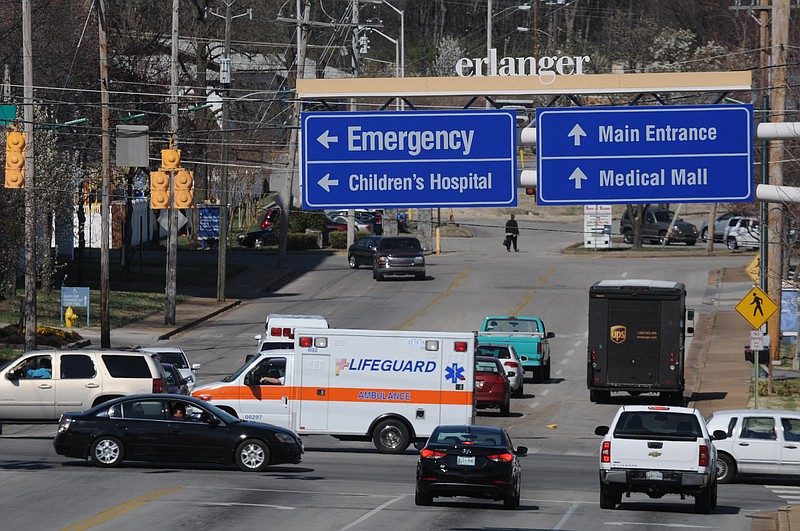To learn more
See the plans and read about the project at www.3rd4thstreetimprovements.com. Submit comments by Dec. 9 to lwasson@chattanooga.gov.
Chattanooga's traffic wizards have a plan to make East Third Street disappear.
The concept unveiled Thursday for unknotting the tangled maze that is the Third Street-Fourth Street corridor between Battery Place and Erlanger hospital eliminates one of the roads altogether.
Not only that, the idea pitched to a roomful of business people, property owners and residents also envisions lowering Riverfront Parkway to create an at-grade crossing at Georgia Avenue; creating new access from Fourth to Riverfront Parkway via Douglas Street; closing the Riverfront exit to Mabel Street and creating an at-grade crossing there, and extending Siskin Drive to the parkway.
The idea is a "complete street" with better connections to the whole downtown area that is safer, more accessible, and friendlier to bikers and pedestrians, as well motor vehicles, said Doug Delaney with Parsons Brinckerhoff, the engineering firm working on the project for the Chattanooga Department of Transportation.
Plans call for a two-way, divided Fourth Street between High Street and Central Avenue, with new or improved intersections to offer drivers more ways to get downtown. An at-grade crossing at Riverfront and Georgia would eliminate the triple dogleg at Lindsay Street to reach the Veterans Bridge, and all the streets now running one-way would be opened for two-way traffic.
Thursday's event at the Development Resource Center was the first look at a concept in the making since early 2015, one that's being tracked with intense interest by people who work or go to school in the area, as well as neighbors in Battery Place.
In fact, the first question after Delaney spoke came from John McDonald with the Battery Place Neighborhood Association. He asked what's in the plan to solve noise and overflow parking problems from the nearby University of Tennessee at Chattanooga.
"We're right on the edge of nonlivability already," McDonald said. Lowering Riverfront Parkway to create new at-grade intersections would just make the noise worse, he said. Especially if westbound trucks have a bunch of new intersections to brake and gear up and down for, starting right at Battery Place, other audience members said.
Delaney and Bert Kuyrkendall, Chattanooga traffic engineer, said there's not much to be done about traffic sounds because the project mostly involves changes to existing streets and not a lot of new construction. And while no sound-barrier walls will be added, project manager Laura Wasson said, reducing speeds and adding trees and open space should help.
She said UTC is working on parking issues - "they're not blind to the problem."
One version of the concept plan includes a multilevel parking garage on Siskin Drive, perhaps with an athletic field on the top for Chattanooga School for the Arts and Sciences students.
Others wanted to know what happens to owners of buildings between Third and Fourth streets, who might lose access for customers and deliveries. A man who didn't give his name said shrinking Fourth Street from four lanes to two plus bike lanes will create a "huge problem" in such a congested corridor.
He said planners could "buy one building and you can keep a two-way pair" on the whole of Fourth Street. The planners answered that the concept plan envisions motor vehicles as only one part of the traffic mix.
Christiane Maisch, who also lives at Battery Place, said she and her neighbors, the only people who actually live in the project area, feel their concerns have been overlooked. She said individual surveys were promised but not taken.
"I think we're just lost in this whole project. We live there, we sleep there, our families are there, and it just seems like it doesn't matter."
Delaney said this initial presentation is just a step on the way and there will be more opportunities for public input.
Several people also asked about the Central Avenue extension to the east, a separate project to link Central to Riverfront Parkway. Wasson said that's already funded and will be finished before this one.
According to CDOT figures, the Third/Fourth Street project is estimated to cost around $17 million. Construction could begin in 2020 and would take two to three years.
Contact staff writer Judy Walton at jwalton@timesfreepress.com or 423-757-6416.
